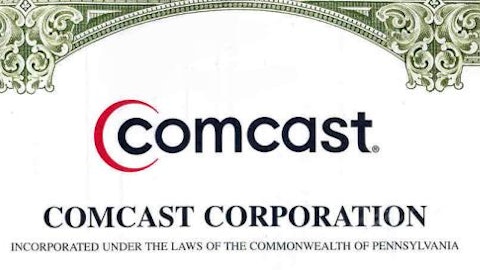Hewlett-Packard Company (NYSE:HPQ) is a shining example of how to fumble one of the biggest shifts in consumer trends in a company’s core business.
Not only was HP unfashionably late to the mobile party, but when it did jump in, it was an utter disaster. webOS has had a long and tragic life under two different corporate umbrellas, and it should be abundantly clear that HP has no intention of bringing future webOS devices to market, despite its pledge to continue supporting the zombie OS.
At this point, HP’s inchoate mobile strategy revolves around OS platforms that aren’t webOS. The company has recently launched a handful of laptops, desktops, convertibles, and tablets running Microsoft Corporation (NASDAQ:MSFT) Windows 8.

HP ENVY x2. Source: HP.
It looks like HP may be making eyes with another popular mobile OS platform now, too: Google Inc (NASDAQ:GOOG) Android.
Making eyes with Big G
According to ReadWriteWeb and separately confirmed by The Verge, HP is in the process of building an Android tablet that will sport one of NVIDIA Corporation (NASDAQ:NVDA)‘s newest Tegra 4 processors that were just recently announced. HP has supposedly been working on the device for at least the past four months, and there’s still no known time frame on when such a tablet might see the light of day.
This comes just after Hewlett-Packard Company (NYSE:HPQ) announced its first Chromebook running Google’s Chrome OS, which retails for $330. The company has started to diversify its PC platform base to wean its reliance on Windows, and doing the same in tablets is the safer move.
Beneath the surface, tensions have been building between Microsoft and its OEM partners because of the software giant’s Surface tablet. The device is a bold strategic move by Microsoft to become more integrated at the risk of competing with the partners it depends on most.
HP’s PC chief Todd Bradley bashed the Surface RT shortly after it launched, calling it “slow and a little kludgey” and downplaying its competitive prospects. At the time, Bradley also said that HP wouldn’t be entering the consumer tablet market in 2012, but 2013 was still on the table.
That, combined with HP’s recent collaborations with Google, makes this most recent report of an Android tablet in the pipeline much more believable.
But will it work?
Domestic PC makers not named Apple Inc. (NASDAQ:AAPL) have a fairly poor track record with tablets. HP and Dell Inc. (NASDAQ:DELL) are the only remaining U.S.-based Windows PC giants, and they have steadily seen their combined market share slip over the years as Asian rivals chip away with lower-cost offerings.

Source: IDC.
Asian OEMs are also the ones that are making some progress in the tablet market. Samsung has climbed to the No. 2 spot. Amazon.com, Inc. (NASDAQ:AMZN) is a worthy contender and its Kindle Fire is built by Taiwan-based Quanta Computer. Google’s own Nexus 7 is similarly built by Asus, which occupies the No. 5 spot in the PC market as well.
I’m interested to know if Hewlett-Packard Company (NYSE:HPQ) will pursue a strategy similar to other OEMs by adding minor third-party software modifications in an attempt to differentiate its devices. I wouldn’t expect the company to go as far as Amazon did, since HP would still rely on Google’s services and content ecosystems, but it could easily tweak Android and try to brand it like other OEMs are keen on doing. The alternative is to ship a “stock” Android device, ensuring a commoditized device. Nexus devices are the only tablets that currently ship with “stock” Android.
What comes next?
What HP chooses to do in tablets will also have bearing on its inevitable revamped smartphone push. The smartphones that HP launched years ago that were little more than rebranded Palm smartphones quickly failed, but Meg Whitman has confirmed that the company has to “ultimately offer a smartphone.”
Perhaps HP will launch Windows Phone 8 devices. Perhaps HP will add an Android smartphone to complement an Android tablet. Perhaps it will do it all.
The article Hewlett-Packard’s Valentine? Android originally appeared on Fool.com and is written by Evan Niu, CFA.
Fool contributor Evan Niu, CFA, owns shares of Apple. The Motley Fool recommends Amazon.com, Apple, Google, and NVIDIA. The Motley Fool owns shares of Amazon.com, Apple, Google, and Microsoft.
Copyright © 1995 – 2013 The Motley Fool, LLC. All rights reserved. The Motley Fool has a disclosure policy.





